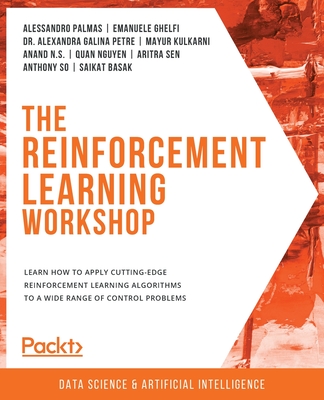Machine Learning Concepts with Python and the Jupyter Notebook Environment: Using Tensorflow 2.0
暫譯: 使用 Python 和 Jupyter Notebook 環境的機器學習概念:運用 Tensorflow 2.0
Silaparasetty, Nikita
- 出版商: Apress
- 出版日期: 2020-09-22
- 售價: $2,490
- 貴賓價: 9.5 折 $2,366
- 語言: 英文
- 頁數: 288
- 裝訂: Quality Paper - also called trade paper
- ISBN: 1484259661
- ISBN-13: 9781484259665
-
相關分類:
Python、程式語言、DeepLearning、TensorFlow、Machine Learning
海外代購書籍(需單獨結帳)
商品描述
Create, execute, modify, and share machine learning applications with Python and TensorFlow 2.0 in the Jupyter Notebook environment. This book breaks down any barriers to programming machine learning applications through the use of Jupyter Notebook instead of a text editor or a regular IDE.
You'll start by learning how to use Jupyter Notebooks to improve the way you program with Python. After getting a good grounding in working with Python in Jupyter Notebooks, you'll dive into what TensorFlow is, how it helps machine learning enthusiasts, and how to tackle the challenges it presents. Along the way, sample programs created using Jupyter Notebooks allow you to apply concepts from earlier in the book.
Those who are new to machine learning can dive in with these easy programs and develop basic skills. A glossary at the end of the book provides common machine learning and Python keywords and definitions to make learning even easier.
What You Will Learn
- Program in Python and TensorFlow
- Tackle basic machine learning obstacles
- Develop in the Jupyter Notebooks environment
Who This Book Is For
Ideal for Machine Learning and Deep Learning enthusiasts who are interested in programming with Python using Tensorflow 2.0 in the Jupyter Notebook Application. Some basic knowledge of Machine Learning concepts and Python Programming (using Python version 3) is helpful.
商品描述(中文翻譯)
在 Jupyter Notebook 環境中使用 Python 和 TensorFlow 2.0 創建、執行、修改和分享機器學習應用程式。本書通過使用 Jupyter Notebook 而非文本編輯器或常規 IDE,打破了編程機器學習應用程式的障礙。
您將首先學習如何使用 Jupyter Notebooks 來改善您使用 Python 的編程方式。在熟悉了在 Jupyter Notebooks 中使用 Python 之後,您將深入了解 TensorFlow 是什麼,它如何幫助機器學習愛好者,以及如何應對它所帶來的挑戰。在此過程中,使用 Jupyter Notebooks 創建的示例程式碼將幫助您應用書中早期的概念。
對於機器學習新手來說,這些簡單的程式碼可以讓您輕鬆入門並發展基本技能。本書末尾的詞彙表提供了常見的機器學習和 Python 關鍵字及其定義,以使學習更加容易。
您將學到什麼
- 使用 Python 和 TensorFlow 編程
- 解決基本的機器學習障礙
- 在 Jupyter Notebooks 環境中開發
本書適合誰
本書非常適合對使用 TensorFlow 2.0 在 Jupyter Notebook 應用程式中進行 Python 編程感興趣的機器學習和深度學習愛好者。具備一些機器學習概念和 Python 編程(使用 Python 3 版本)的基本知識將會有所幫助。
作者簡介
Nikita Silaparasetty is a Data Scientist and an AI/Deep Learning Enthusiast specializing in Statistics and Mathematics. She is presently the head of the Indian based 'AI For Women' initiative, which aims to empower women in the field of Artificial Intelligence. She has strong experience programming using Jupyter Notebooks and a deep enthusiasm for TensorFlow and the potentials of Machine Learning. Through the book, she hopes to help readers become better at Python Programming using Tensorflow 2.0 with the help of Jupyter Notebooks, which can benefit them immensely in their Machine Learning journey.
作者簡介(中文翻譯)
Nikita Silaparasetty 是一位數據科學家及人工智慧/深度學習愛好者,專注於統計學和數學。她目前是印度「AI For Women」計畫的負責人,該計畫旨在賦權女性在人工智慧領域的發展。她在使用 Jupyter Notebooks 進行程式設計方面擁有豐富的經驗,並對 TensorFlow 及機器學習的潛力充滿熱情。通過這本書,她希望幫助讀者在使用 Jupyter Notebooks 的過程中,提升 Python 程式設計能力,這將對他們的機器學習之旅帶來巨大的幫助。






























